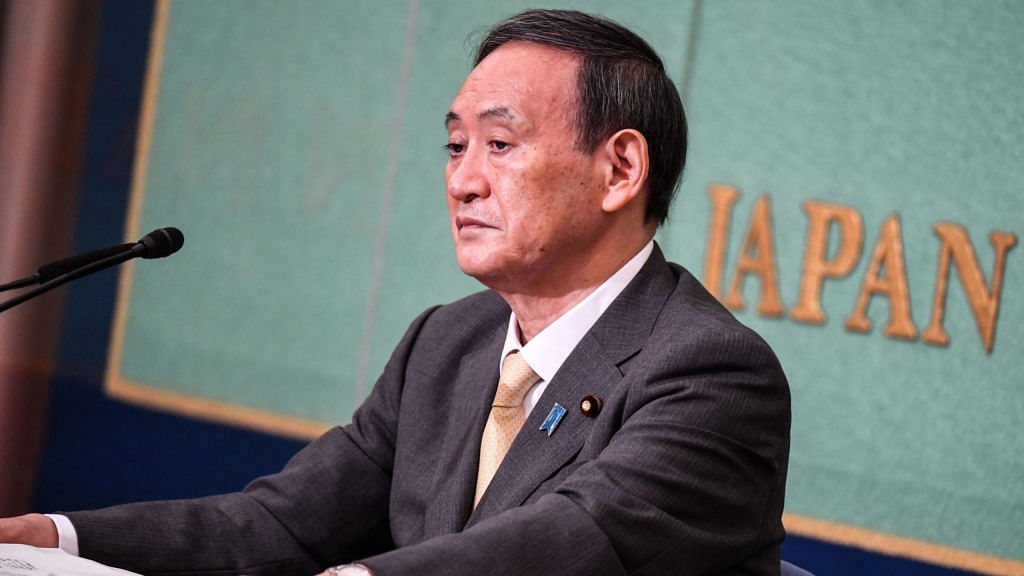New Delhi: The much-anticipated foreign ministers’ meeting of the ‘Quad’ countries — US, Australia, India and Japan — is now likely to be held in Tokyo instead of New Delhi next month, ThePrint has learnt.
This comes after a change in leadership in Japan after Yoshihide Suga took over as prime minister from Shinzo Abe after being elected by the country’s Parliament Wednesday. Japan is now keen to signal that it is ready to stand firm against China within the Indo-Pacific region under the new dispensation.
With the change of dispensation, Tokyo wants to assert that its priorities have not changed under their new PM, diplomatic sources told ThePrint.
It is also likely that Foreign Minister S. Jaishankar will meet PM Suga on the sidelines of the ‘Quad’ meeting, the sources said.
Suga will also be meeting US Secretary of State Mike Pompeo and Australian Foreign Minister Marise Payne.
Being “like-minded democracies”, all these countries are looking to create a united front against China’s growing belligerence with its neighbours.
This year, the main agenda of the meeting will be to ascertain the future course of action for the ‘Quad’.
The ‘Quad’ or the Quadrilateral Security Dialogue, was proposed by former Japan PM Abe in order to check China’s growing influence and assertiveness in the Indo-Pacific region. It is an informal setup of countries that aims to strengthen the defence and security cooperation amongst the four countries.
The last such meeting of the Quad foreign ministers was held in New York in September 2019.
Also read: PM Modi congratulates Japan’s new PM Yoshihide Suga, hopes to take strategic ties forward
India’s deepening ties with Japan, US
Just before Abe resigned from his post, New Delhi and Tokyo signed the much-awaited Acquisitions and Cross Servicing Agreement (ACSA), or the Agreement on Reciprocal Provision of Supplies and Services between the Indian Armed Forces and the Self-Defense Forces of Japan, earlier this month to boost the growing defence ties between them.
“This will be a good opportunity for all (Quad) countries to meet and understand the new Japanese Prime Minister. Japan wants to showcase that the Quad remains a top priority for them despite Prime Minister Abe stepping down,” said Rajeshwari Pillai Rajagopalan, distinguished fellow and head (nuclear & space policy initiative), Observer Research Foundation.
“It is important for these meetings to take place in order to slowly give the Quad a formal outlook, which will take some time. But it is a positive sign that a significant number of countries are coming together cohesively against China,” Rajagopalan added.
Last week, while launching a report on India-Japan relations, Jaishankar had said Japan was the only country with which India held an annual summit as well as a 2+2 format dialogue between the foreign and defence ministries.
Sources also said India’s participation in the Quad meeting this time assumes crucial significance as tensions between New Delhi and Beijing have touched its peak with a four-and-a-half month border standoff between both troops at the Ladakh sector of the Line of Actual Control (LAC).
India has also signed three key defence inter-operability agreements with the US as New Delhi gears up to become a prominent player in the Indo-Pacific region amid the heightened tensions with China.
These pacts — Logistics Exchange Memorandum of Agreement (LEMOA), Communications Compatibility and Security Agreement (COMCASA) and Industrial Security Annex (ISA) — are all aimed at deepening defence and strategic ties between the US and India.
Washington and New Delhi are also going to hold their 2+2 dialogue next month when both sides are going to sign the Basic Exchange and Cooperation Agreement (BECA), which will enable India to avail US expertise on geospatial intelligence and sharpen the accuracy of weapons and automated hardware systems used for military purposes.
Also read: Japan’s new leader Suga seeks to end ‘curse’ of revolving-door PMs
